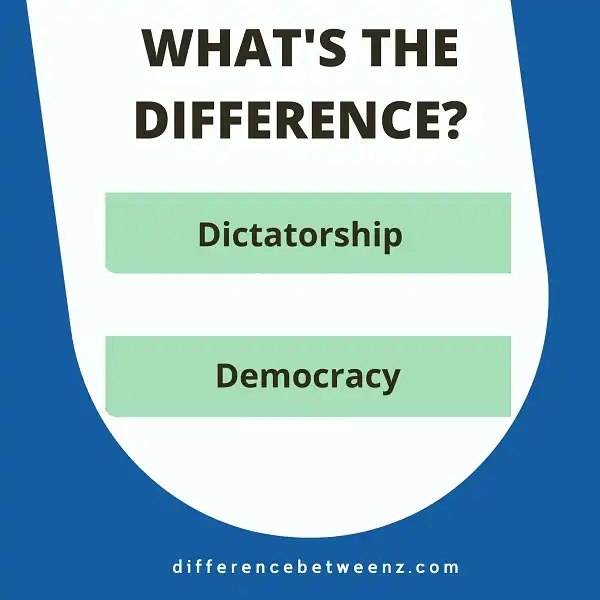Want to know more about What Is The Difference Between A Democracy And Dictatorship? Read this article to get the information you need.

Democracy vs Dictatorship: Unveiling the Distinctive Features
Imagine a world where your voice, along with the collective voices of your fellow citizens, shapes the decisions that govern your society. That’s the essence of democracy, a form of government where power resides with the people. However, in a stark contrast stands dictatorship, a system where absolute authority is vested in a single individual or a small group, leaving little room for popular participation.
Defining Democracy and Dictatorship
Democracy, derived from the Greek words “demos” (people) and “kratos” (power), is a system of government where the ultimate authority lies with the people. Citizens have the right to participate in decision-making through periodic elections, where they choose their representatives to form a government that acts in their best interests.
On the other hand, dictatorship, originating from the Latin word “dictator,” is a form of government where power is concentrated in the hands of an individual, known as a dictator. Dictators exercise absolute authority, suppressing dissent and denying citizens basic political rights and freedoms.
Understanding the Differences
The fundamental difference between democracy and dictatorship lies in the distribution of power. In a democracy, power is diffused among the citizens, who have the final say in shaping their government. In contrast, dictatorship centralizes power in the hands of a single ruler, leaving little or no room for popular participation.
Another key distinction lies in the respect for individual rights and freedoms. Democracies prioritize the protection of basic human rights, including freedom of speech, assembly, and the press. Dictatorships, on the other hand, often suppress these freedoms, perpetuating a culture of fear and silence.
Furthermore, democratic governments are typically based on the principles of the rule of law and accountability. Decisions are made transparently, and elected officials are subject to oversight and scrutiny. Dictatorships, however, are characterized by arbitrary rule and a lack of accountability, with the dictator’s will being the supreme law.
Evolution of Democracy and Dictatorship
Democracy has its roots in ancient Greece, where citizens actively participated in decision-making through assemblies and elections. Over the centuries, democratic ideals spread throughout Europe and the Americas, influencing the development of modern democratic systems.
Dictatorship, on the other hand, has existed throughout history, often emerging during periods of political instability or economic turmoil. Dictators often come to power through coups or military takeovers, promising order and stability amidst chaos. However, they frequently end up suppressing dissent, abusing their authority, and perpetuating their own power.
Current Trends and Developments
In recent years, the world has witnessed a resurgence of authoritarianism, with the rise of dictators in several countries. This trend has raised concerns about the erosion of democratic values and the increasing concentration of power in the hands of a few.
However, there are also encouraging signs of democratic resilience. Citizen movements and protests around the world have successfully resisted authoritarian attempts to dismantle democratic institutions and suppress dissent.
Expert Insights and Advice
Experts emphasize the importance of civic engagement and education in safeguarding democracy. Encouraging citizens to participate in their government, both through voting and other forms of civic involvement, is essential for a healthy and vibrant democracy.
Educating citizens about their rights and responsibilities, as well as the principles of democratic governance, helps them make informed decisions and hold their leaders accountable. Additionally, supporting independent media and freedom of expression is crucial for ensuring that the public has access to unbiased information and can hold the government to account.
FAQ
- What are the main characteristics of a dictatorship?
A dictatorship is characterized by the concentration of power in the hands of a single individual or group, suppression of dissent, and a lack of accountability and the rule of law.
- Can a democracy ever turn into a dictatorship?
Yes, a democracy can transition into a dictatorship if democratic institutions are weakened, human rights are suppressed, and the rule of law is undermined.
- What are the benefits of democracy over dictatorship?
Democracy fosters popular participation, protects individual rights, and promotes transparency and accountability, fostering a more just and equitable society.
Conclusion
The choice between democracy and dictatorship is a profound one that shapes the very fabric of a society. Democracy, with its emphasis on popular participation and respect for human rights, empowers citizens and creates a more just and equitable world. Dictatorship, on the other hand, stifles dissent, suppresses freedoms, and perpetuates the unchecked power of a few.
As citizens, it is our responsibility to understand the distinctions between these two systems and to actively engage in preserving and strengthening the democratic values that we cherish. By doing so, we can ensure that future generations inherit a world where their voices matter and their rights are protected.
Are you interested in learning more about the differences between democracy and dictatorship? Have you encountered any examples or have any thoughts on the topic? Share your perspectives in the comments below.

Image: whats-different.com
What Is The Difference Between A Democracy And Dictatorship has been read on our site. Thank you for your visit. We hope you benefit from What Is The Difference Between A Democracy And Dictatorship.







